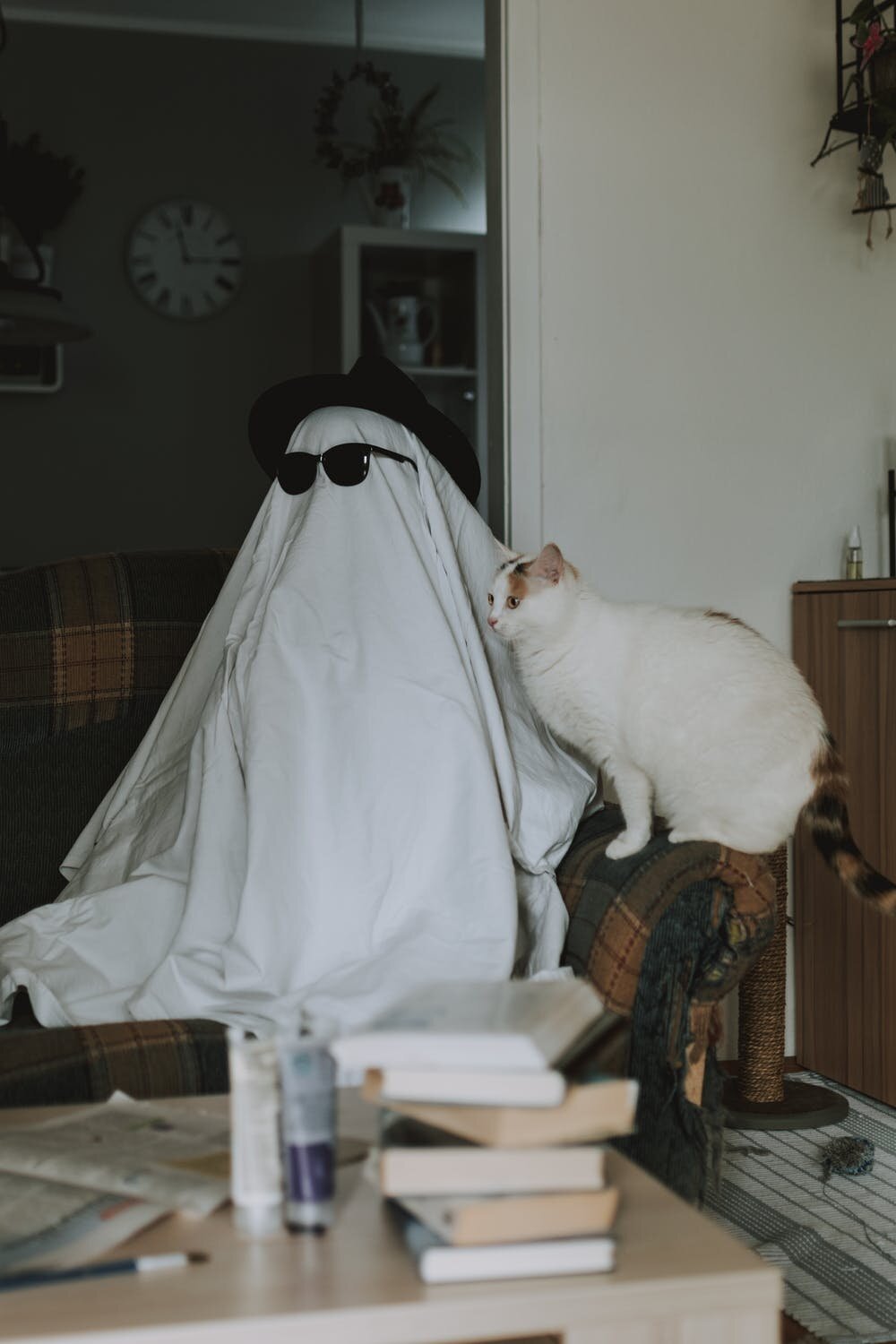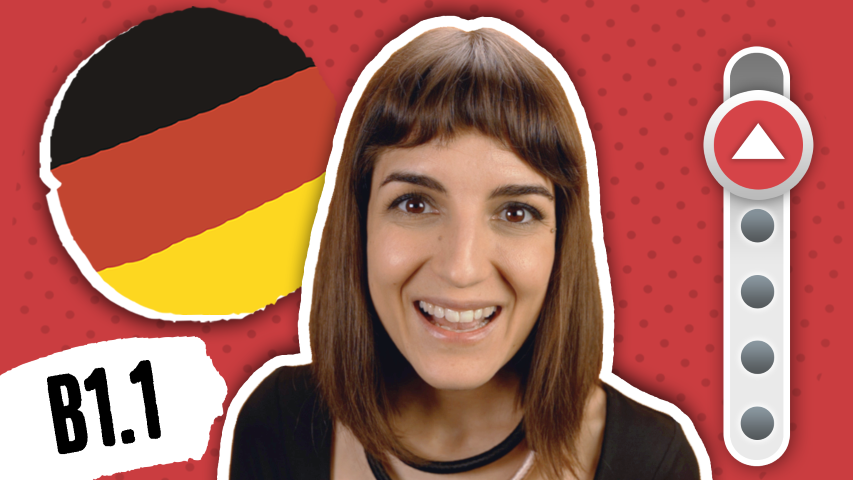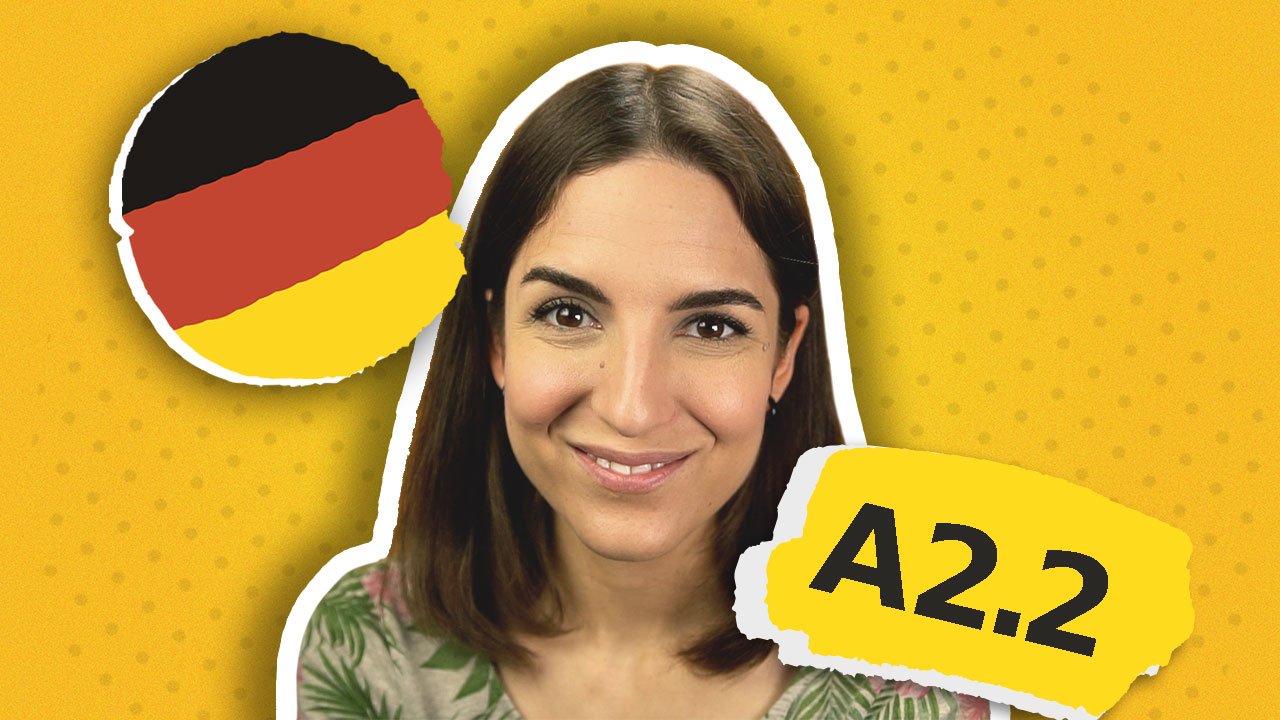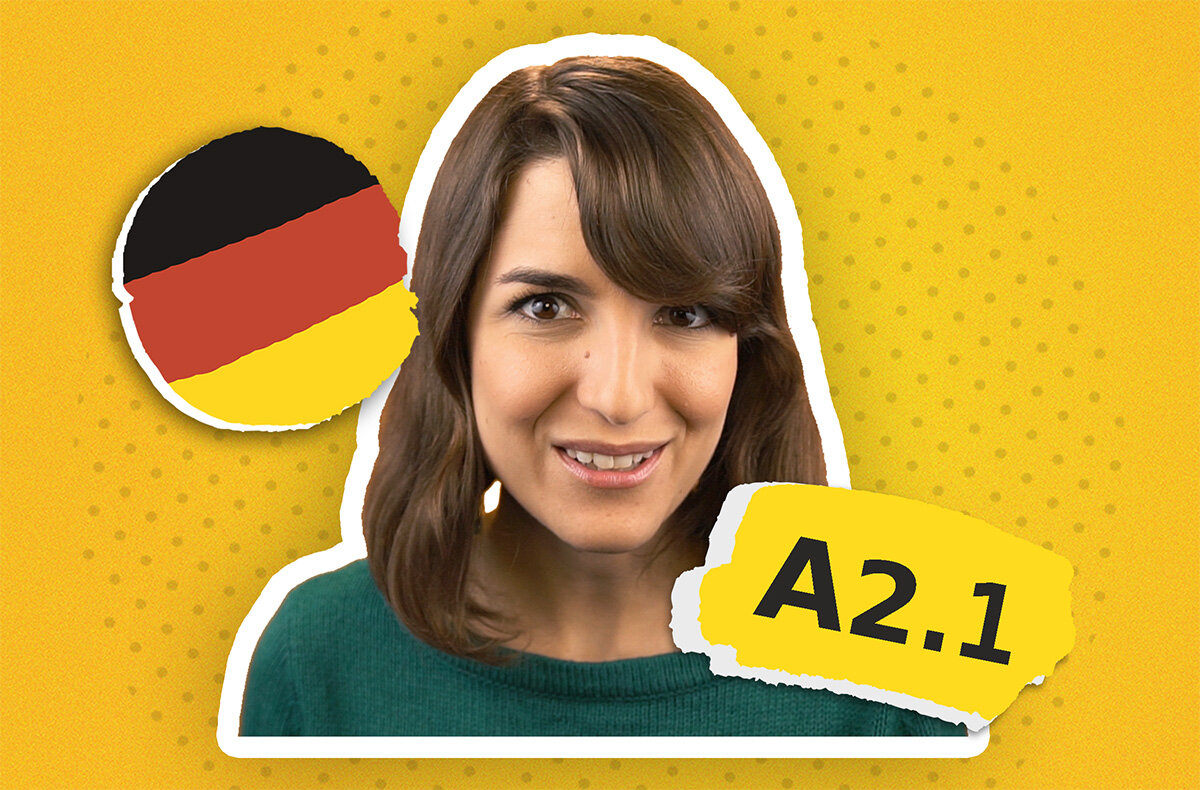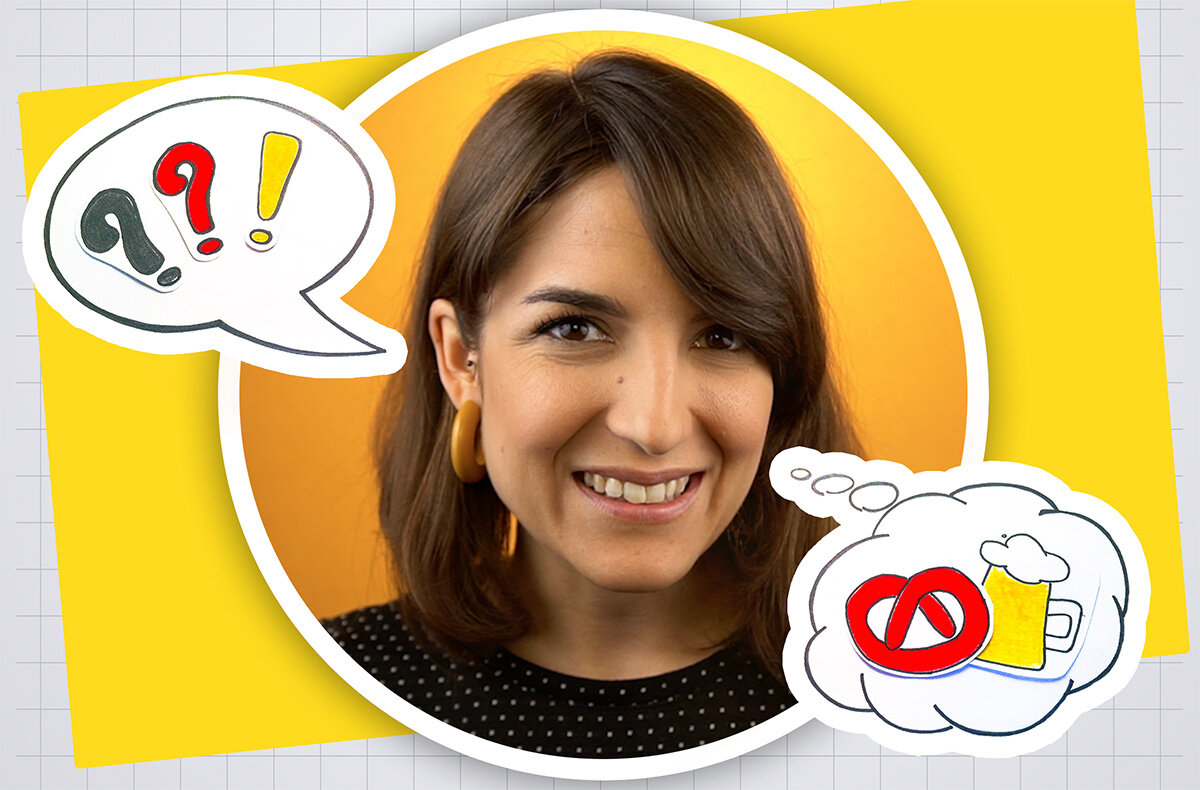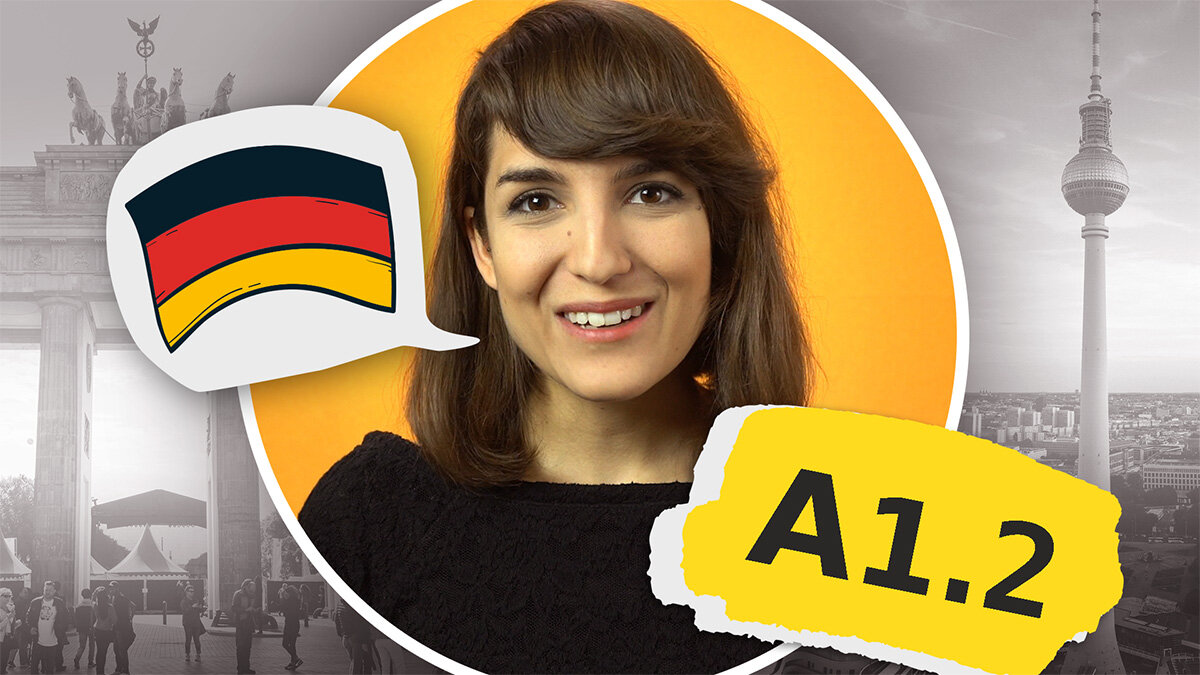The present tense of German verbs
Boo!
Matt has decided to pull a prank on Erich, his pen pal from Germany. He is going to send him a picture of himself dressed as a ghost. Matt is somewhat old-fashioned, something you’ve probably already noticed, as he is writing someone a letter, something that isn’t that common anymore. Even though he is dressed as a ghost from the past, Matt would like to write Erich a letter about his present life, which is why he’s currently learning German present tense.
German present tense might seem difficult to beginners, as you must learn the endings by heart. But hopefully, as you’ll see in this lesson, it isn’t that complicated. And at the end of the lesson, you can test your knowledge and see the photo Matt took and what he ended up writing to Erich!
Getting started: Finding a verb
First, you’re going to need a verb. There must be a verb you’ve really liked in the past lessons. You can also find one in the vocabulary. It is of course quite practical to have the dictionary in the book form, but here are some great online dictionaries:
Since Matt is writing a letter, let us take the word “schreiben” (which means “to write”) for starters!
Good to know!
Like English, German also has irregular verbs, but for now, let’s concentrate on the present tense of the regular verbs!
Learning the endings
As in English, the German present tense also has different endings depending on the person or people it’s referring to. For instance, in English we have “I write”, but “He writes”. You can try learning the endings by heart or you can learn them by observing the examples (in this lesson) of the verbs changing in the present tense.
German present tense endings are:
-e
-st
-t
-en
-t
-en
If you’ve already mastered the personal pronouns, here’s how the endings would look like in the table with the matching pronouns!
A) SINGULAR matching present tense ending
ich → -e
du → -st
Sie (formal) → -en
er → -t
sie → -t
es → -t
B) PLURAL matching present tense ending
wir → -en
ihr → -t
Sie (formal) → -en
sie → -en
sie → -en
sie → -en
Applying the endings
The form of the verb you’ll find in the dictionaries is called the infinitive form. In German, the infinitive of the verbs ends in either -en or -n. Now, when applying the endings for the present tense, you remove the -en or -n and add the ending depending on the person it’s referring to. Let’s try it out!
So, we have here our verb “schreiben”. Here the infinitive ending is “en”. We remove this ending and end up with the basis “schreib” to which we can add endings depending on our sentence. You also shouldn’t forget about the formal and informal German forms, which you’ve learned in the lesson about personal pronouns. Here is a short reminder for the tricky ones!
The formal „Sie“ is always capitalized and combined with a verb in its plural form. It means “you” and is therefore used to address the people you’re directly communicating with. We use it to address one person (like in the first example here) or multiple people (like in the second example here) with whom we have a professional relationship with or whom we don’t know well.
We use “ihr” to address multiple people we know very well. We use it to address our family members and our friends.
The „sie“ used to refer to a female person is combined with a verb in its singular form. It is never capitalized unless it appears at the beginning of the sentence. But even then, you can recognize what it refers to by noticing that the verb is in its singular form: In these examples, it is combined with “ist” (“is” - singular form) and not with “sind” (“are”- plural form), which means it refers to one person who is female.
Let’s see that on examples! As a help, the tricky formal and informal forms are specially emphasized!
Let’s say “I’m writing a letter”.
Ich schreibe einen Brief. I’m writing a letter.
Du schreibst einen Brief. You‘re writing a letter. (singular, informal)
Sie schrieben einen Brief. You‘re writing a letter. (singular, formal)
Er schreibt einen Brief. He‘s writing a letter.
Sie schreibt einen Brief. She‘s writing a letter.
Es schreibt einen Brief. It’s writing a letter.
Wir schreiben einen Brief. We‘re writing a letter.
Ihr schreibt einen Brief. You’re writing a letter. (plural, informal)
Sie schreiben einen Brief. You’re writing a letter. (plural, formal)
Sie schreiben einen Brief. They’re writing a letter.
Hopefully, that wasn’t so scary:) Let’s see the endings applied to some other verbs you probably already know. Try reading these examples aloud, as it may help you learn the endings better when you hear them applied over and over!
Let’s see how the present tense looks when applied to the verb “kochen” (“to cook”).
Ich koche Eier. I’m cooking eggs.
Du kochst Eier. You’re cooking eggs. (singular, informal)
Sie kochen Eier. You’re cooking eggs. (singular, formal)
Er kocht Eier. He’s cooking eggs.
Sie kocht Eier. She’s cooking eggs.
Es kocht Eier. It’s cooking eggs.
Wir kochen Eier. We’re cooking eggs.
Ihr kocht Eier. You’re cooking eggs. (plural, informal)
Sie kochen Eier. You’re cooking eggs. (plural, formal)
Sie kochen Eier. They’re cooking eggs.
Let’s see how the endings work on some other verbs you’ve learned in the past lessons!
Ich singe ein Lied. I’m singing a song.
Du singst ein Lied. You‘re singing a song. (singular, informal)
Sie singen ein Lied. You‘re singing a song. (singular, formal)
Er singt ein Lied. He‘s singing a song.
Sie singt ein Lied. She‘s singing a song.
Es singt ein Lied. It‘s singing a song.
Wir singen ein Lied. We‘re singing a song.
Ihr singt ein Lied. You’re singing a song. (plural, informal)
Sie singen ein Lied. You’re singing a song. (plural, formal)
Sie singen ein Lied.They’re singing a song.
and
Ich lerne Deutsch. I’m learning German.
Du lernst Deutsch. You‘re learning German. (singular, informal)
Sie lernen Deutsch. You‘re learning German. (singular, formal)
Er lernt Deutsch. He’s learning German.
Sie lernt Deutsch. She’s learning German.
Es lernt Deutsch. It‘s learning German.
Wir lernen Deutsch. We’re learning German.
Ihr lernt Deutsch. You’re learning German. (plural, informal)
Sie lernen Deutsch. You‘re learning German. (plural, formal)
Sie lernen Deutsch. They’re learning German.
Here are some other examples!
Du machst deine Hausaufgaben. You’re doing your homework. (Literally: You’re making your homework)
Er kommt am Montag. He comes on Monday.
Sie heißt Tina. Her name is Tina. (Literally: She is called Tina)
Ihr geht ins Büro. You’re going in the office.
Frau Müller, wie finden Sie die Torte? Miss Müller, how do you like the cake? (Literally: Miss Müller, how do you find the cake?)
Was machstdu? What are you doing?
What we’ve learned today?
With regular German verbs, one only has to remove the ending “-en” (in some cases “-n”) to be able to get the basis to which we can add endings for the present tense. So, if we have the verb “kochen”, we remove “-en” and we’re left with the basis “koch”. To this basis we add the endings: -e,-st,-t,-en,-t,-en.
Or applied to our basis:
ich koche, du kochst, Sie kochen, er kocht, sie kocht, es kocht, wir kochen, ihr kocht, Sie kochen, sie kochen.
schreiben → to write
Brief, der → letter
kochen → to cook
Eier → eggs
singen → to sing
Lied, das → song
lernen → to learn
Deutsch, das → German (language)
machen → make, do
Hausaufgaben → homework (plural)
kommen → to come
Montag, der → monday
heißen → to be called, to be named
gehen → to go
Büro, das → office
finden → find, like
Torte, die → cake
was → what
Test your knowledge
The best way to learn the present tense is surely through practice! Solve these questions and see what you’ve learned so far and if you maybe need to work on some more on certain parts of the lesson!
1.) Fill in the missing endings for the present tense of the verb “brauchen” (“to need”)!
- a) Ich brauch____
- b) Er brauch____
- c) Wir brauch____
- d) Ihr brauch____
- e) Du brauch____
- f) Es brauch____
2.) In which of these sentences is the ending for the present tense incorrectly applied?
- a) Ich komme aus Deutschland.
- b) Du kochst Eier.
- c) Er hat zwei Katzen.
- d) Frau Heinz, singst Sie gerne?
- e) Laura kommt am Montag.
- f) Ihr singt ein Lied.
3.) Fill in the missing endings for the present tense of the verb “schreiben” (“to write”)!
- a) Maria ist meine Schwester. Sie schreib____ einen Brief.
- b) Herr Schmidt, schreib____ Sie einen Brief?
- c) Markus und Lukas sind unsere Freunde. Sie schreib____ einen Brief.
- d) Frau Heinz und Herr Schmidt, schreib____ Sie einen Brief?
4.) Choose the correct answer: Wir ______________ Eier.
- a) koche
- b) kochen
- c) kocht
- d) kochst
- e) kochlam
5.) Choose the correct answer: Du ______________ ein Lied.
- a) singen
- b) singst
- c) singt
- d) sing
- e) song
Here are the correct answers, check if you got them right!
1.a) e b) t c) en d) t e) st f)t
2.) d
3.) a) t b) en c) en d) en
4.) b
5.) b
Now, let’s see what happened with Matt and his letter!
Sooo….this is the photo he sent Erich!
He wrote about his books and, of course, his cat Cocco. Erich found Matt’s descriptions of the boring everyday life of a ghost very funny. He thought that the use of the present tense was very clever and made it even funnier. Seems like nowadays even ghosts have to learn the grammar!
You may also be interested in taking one of our courses


